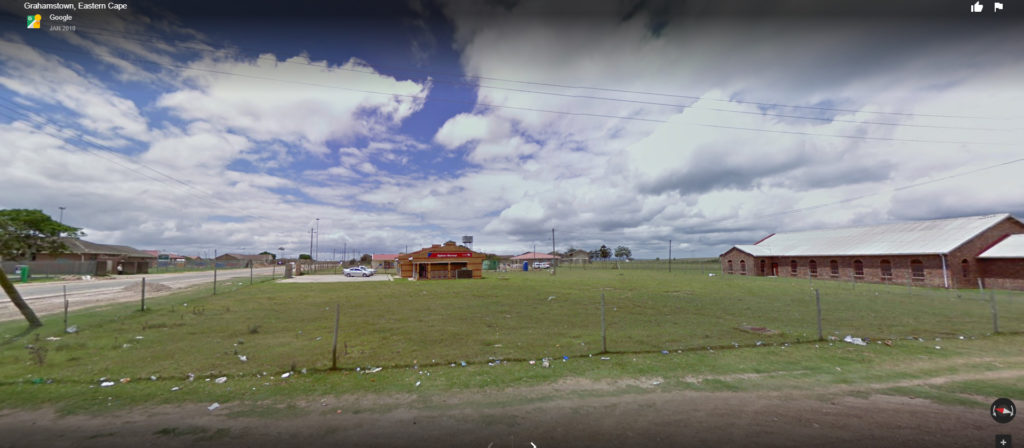As you drive east up Raglan Road towards Miki Yili Stadium for Saturday’s Freedom Day celebrations, take a detour and turn left at Nompondo Street. 200 metres along and to the right, on the corner of Ncame Street, you’ll see the Siphiwo Mazwayi Post Office. We republish a piece written by Elron Kleinhans and Sinethemba Yame in 2012 about one of Makhanda’s (Grahamstown’s) Freedom Struggle heroes. The research on the town’s social and cultural history was a partnership between the Albany Museum and Rhodes University’s Isikhumbuzo Applied History Unit.
Born and raised in Grahamstown, Siphiwo Mazwayi secretly left the country to join the armed forces of the African National Congress, Mkhonto weSizwe. He ultimately lost his life in a shoot-out with the South African Police, in which he refused to surrender.
He attended Makana Primary School and Nathaniel Nyaluza High School where he excelled academically. Upon completing his schooling Mazwayi went to further his education at the University of Fort Hare studying law. According to one of his friends, “Siphiwo was a very good rugby player and was recruited to play for the University of Fort Hare. At this stage, while studying law and debating politics, Siphiwo became
politically active. His political involvement eventually led to his expulsion from the University of Fort Hare.”
Siphiwo’s mother Toni Lillian Mazwayi was confronted by the Police’s Special Branch on the whereabouts of her son. She had no knowledge that he was no longer studying at Fort Hare, nor did she know where he was. She asked Nomhle and Zodwa (Siphiwo’s sisters) who indicated that Siphiwo had gone to Butterworth at the time to visit some of his lawyer friends. He disappeared after this.
It was later discovered that he had ‘crossed the borders’, and Mrs. Mazwayi immediately knew that her son was involved with the armed struggle. Zodwa undertook the journey to find her brother in Maseru, Lesotho but could not locate him. Siphiwo phoned Mrs Mazwayi a few years later. When she asked him when he would be returning all he could say was “Abo bazibuya bakonwaba, akukhataleki noba ndiyabuya okanye, kodwa abo bazo buya bakonwaba.”
“Those who come back will be those who’;d enjoy, it doesn’t matter whether I do not come back, but those who will be coming back will enjoy!”
Mr S Moyikwa recalled that Siphiwo was his commander. In 1983, he met Siphiwo in Lesotho, after he had received his training in the Soviet Union and Germany. He was part of the SACP before going into exile and joining Mkonto weSizwe – the military wing of the ANC.
Siphiwo was travelling by car with two comrades in the Transkei when the police tried to arrest him. He escaped but was later found by the police who asked him to come down from the top of a chimney in Mount Fletcher and give himself up. He chose to open fire at the police knowing he would die. The other two comrades ran away and he was left fighting until he was overpowered and shot.
According to Mrs Mazwayi, on the Friday before Siphiwo’s funeral, “somebody came and fetched me, Reverend Umgobo was also fetched. They asked me who was going to do the ceremony and I stated that the Reverend will do it. They also asked who the undertakers were, and I said it was Matebesi who was also there. Then we were taken to the office of the Special Branch at the OK buildings in Grahamstown. It was a houseful. I was informed that my son was a well-trained guerrilla and that the people who attend the funeral had to be limited to 200 in number. The person who was conducting the ceremony can only be the Reverend. There can be no freedom songs, speeches, nothing”. Mrs Mazwayi’s recollection of the funeral is that of a war, “it seemed as if it was a battle. There's a big gate next to Joza. There was a convoy,
police, soldiers, hippos, everybody. This convoy was just next to my house and my house was surrounded by the police. It stretched for quite a long distance. They were all armed.”
Although Siphiwo Mazwayi lived a short life, he left a militant legacy from his active political involvement within Mkonto weSizwe, the ANC and Grahamstown as a whole. Two branches of the ANC in the Eastern Cape are named after him and Grahamstown now has a Post Office bearing his name. His life is not only celebrated in Grahamstown, but also Mount Fletcher honoured him with a memorial plaque where he was killed.
https://www.grocotts.co.za/2019/04/25/culture-from-exile-dakawa-art-centre/


